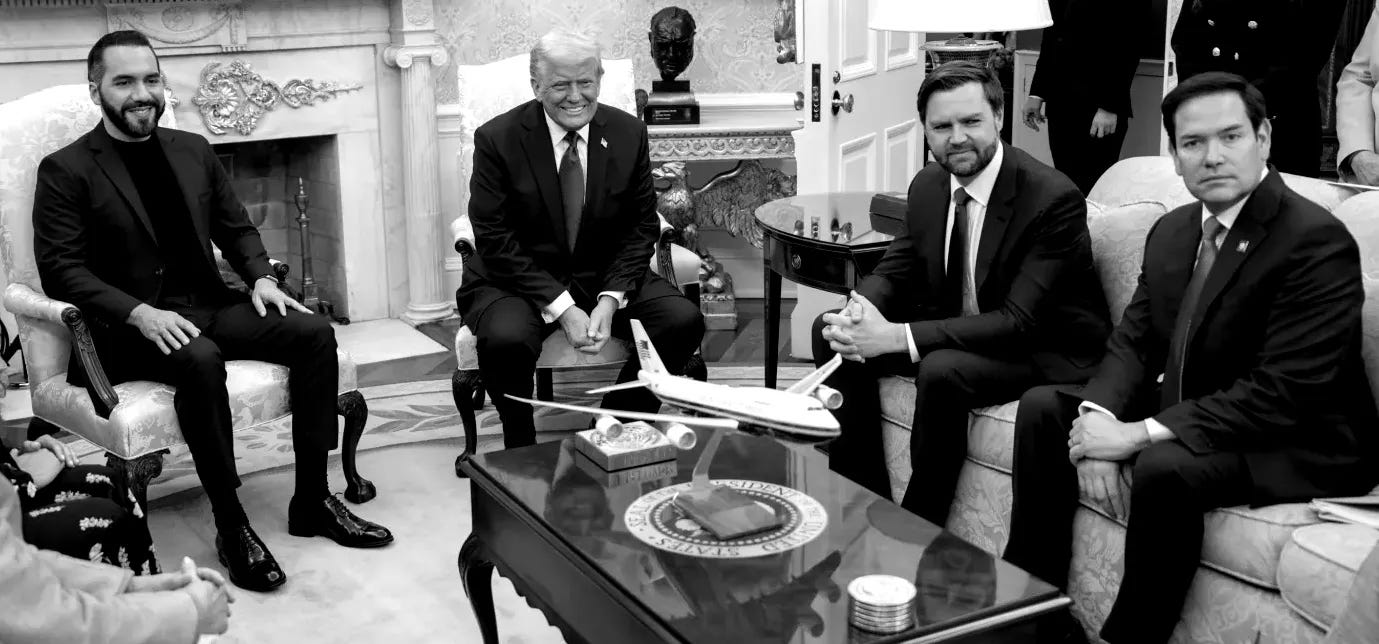The US has made incoherence its ideology on LATAM
Rubio and Trump have spent weeks going to bat for convicted criminals, dictators, and accused coup-plotters in the name of "democracy"
Over the last few weeks, US State Department rhetoric on “democracy” has seemed incoherent on its surface. The administration has gone to bat for an ex-President accused of plotting a coup in Brazil, and backed that support up by starting a trade war with the largest economy in Latin America.
Secretary of State Marco Rubio has sharply criticized the outcome of a 6-month trial in Colombia, in which another right-wing former head of state in Colombia was convicted of bribing witnesses and fraudulent court processes.
And Tuesday afternoon, a State Department spokesman made a public statement supporting Nayib Bukele’s “President for Life” Constitutional reforms that would allow for indefinite re-election.
Opposition leaders in El Salvador have called the changes, approved unilaterally by the Legislative Assembly, where Bukele’s party holds a supermajority, “the end of democracy.”
The move has also been criticized by dozens of current and former presidents across Latin America.
Bukele also imposed a “temporary” state of emergency that strips citizens of basic civil rights in El Salvador and empowers police to make arbitrary arrests that has lasted nearly three years. El Salvador under Bukele has also passed laws that allow the government to persecute critical journalists, and become the nation with the highest per-capita prison rate on Earth.
Even the most anodyne international media companies from around the world have begun to standardize using the word “dictator” when describing Bukele in their coverage.
But on Tuesday, a State Department spokesman speaking with media company EFE pushed back.
“We reject the comparison of El Salvador's legislative process, which is based on democracy and constitutionally sound, with illegitimate dictatorial regimes in other parts of our region,” he said. “The Legislative Assembly of El Salvador was democratically elected to promote the interests and policies of its constituents.”
Human Rights Watch, Amnesty International, and other human rights organizations in Latin America have denounced the move, comparing it to similar “reforms” in Nicaragua and Venezuela.
Ironically, US Secretary of State Marco Rubio has a long history of condemning similar legislation (or attempts at enacting such legislation) in Bolivia, Venezuela, and Nicaragua.
But the word choice of Rubio and other State officials doesn’t matter, and the hypocrisy is only surface-level. They aren’t violating any principles because they have no principles.
Right-wing strongmen will be supported, and loyal ones will be supported even at considerable cost to the United States in terms of both treasury and reputation, such as is the case with Bolsonaro in Brazil and Bukele in El Salvador.
And any government perceived as “left” will be presented as illegitimate, whether they really are an authoritarian and oppressive state, such as in the cases of Venezuela and Nicaragua, or whether Rubio simply lies about them being so, as is the case in both Brazil and Colombia.
To be fair, the US has a long history of supporting right-wing dictatorships in Latin America. Perhaps Rubio does have an ideology after all: he is simply a traditionalist in the Cold War sense.
And in that school of thought, “freedom” and “liberty” are merely the window dressing for the state terrorism imposed by people like Bukele and advocacy for impunity for the powerful, which is what Rubio seeks with Bolsonaro and Uribe.
Fortunately for Latin America, he only fools the most adamant ultra-right voices in the region.
Everyone else sees it for exactly what it is: cynical politicking.
You can also donate a one-time gift via “Buy Me a Coffee”. It only takes a few moments, and you can do so here.
And if you can’t do any of that, please do help us by sharing the piece! We don’t have billionaire PR teams either.




